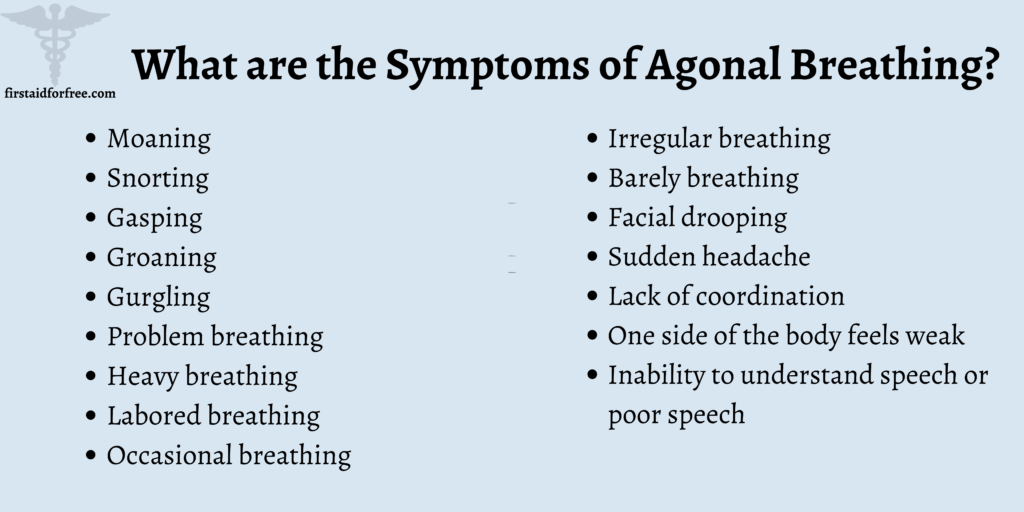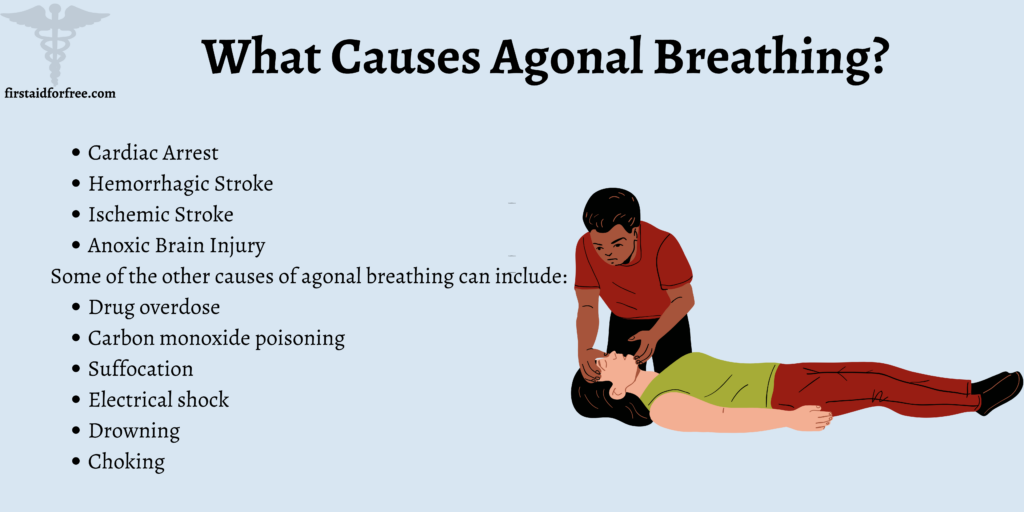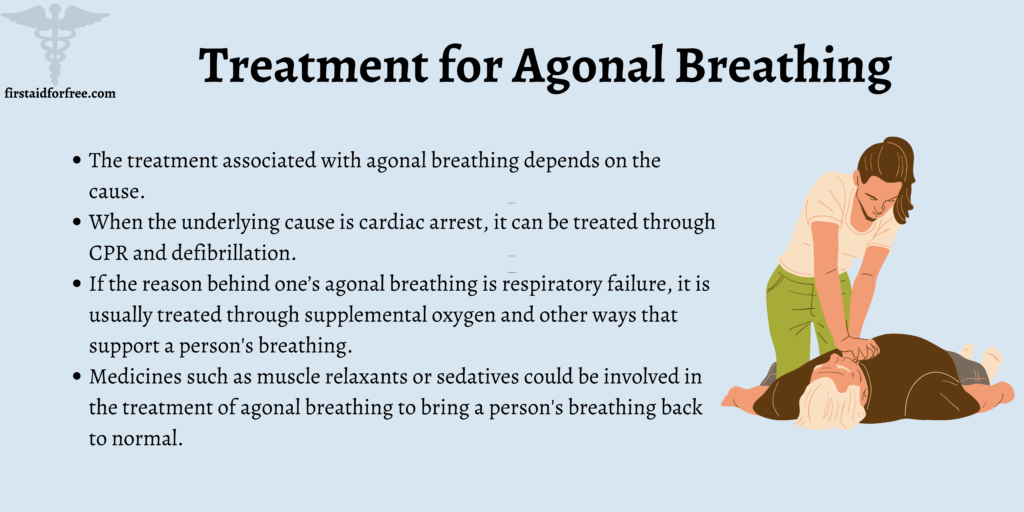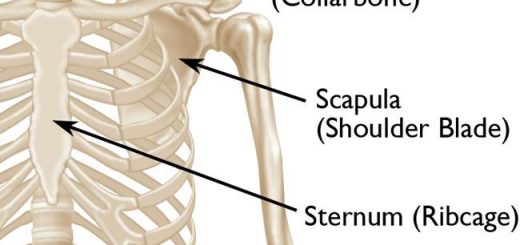Agonal Breathing: Causes, Symptoms and Emergency Response
If you have ever come across the phrase ‘agonal breathing’ but aren’t sure of what it means, we are here for a discussion. Before we go into the details, here are a couple of things you should know about agonal breathing:
- Agonal breathing, which is also known as agonal respiration, is a medical term given to the gasping that a person does when they are struggling to breathe.
- The situation could arise due to cardiac arrest or some other medical emergency, such as a stroke.
- Agonal breathing is not true breathing.
- Such breathing is a natural reflex that occurs when one’s brain doesn’t receive the amount of oxygen needed to keep functioning.
- It’s often a sign that a person is nearing their death.
- If a person begins to experience agonal breathing, you should call the emergency medical services immediately.
What are the Symptoms of Agonal Breathing?
Agonal breathing can often sound like this:
- Moaning
- Snorting
- Gasping
- Groaning
- Gurgling
If you witness a person displaying either of the symptoms mentioned below, they are possibly experiencing agonal breathing:
- Problem breathing
- Heavy breathing
- Labored breathing
- Occasional breathing
- Irregular breathing
- Barely breathing
Agonal breathing often occurs when someone is having a stroke. In such a situation, the symptoms could include:
- Facial drooping
- Sudden headache
- Lack of coordination
- One side of the body feels weak
- Inability to understand speech or poor speech
What Causes Agonal Breathing?
The possible reasons or causes that can lead to agonal breathing are as follows:
Cardiac Arrest
When a person’s heart suddenly stops beating, it means they are having a cardiac arrest. This stops the supply of oxygen-rich blood to the brain and other organs of the body. People who experience a cardiac arrest often have shallow and labored breathing.
Hemorrhagic Stroke
A hemorrhagic stroke is a kind of stroke that occurs when there is bleeding around or within the brain. This can lead to labored breathing.
Ischemic Stroke
Ischemic stroke, which is also known as a mini-stroke, takes place when there is an obstruction of an artery that is responsible for supplying blood to the brain. It’s the most common kind of stroke.
Anoxic Brain Injury
When an injury causes damage by disrupting oxygen supply to the brain, it’s called an anoxic brain injury. This can occur during an ischemic stroke or a cardiac arrest.
Some of the other causes of agonal breathing can include:
- Drug overdose
- Carbon monoxide poisoning
- Suffocation
- Electrical shock
- Drowning
- Choking
What to Do When Someone Experiences Agonal Breathing?
If you witness someone experiencing agonal breathing, here is what you should do:
- Get professional help immediately. If there are other people around, ask one of them to call the emergency medical services. In case you’re the only one with the victim or patient in question, call the emergency services yourself while being next to the person.
- Time the gasps to determine whether the person is experiencing agonal breathing. If the gasps are sporadic and take place less than 13 times per minute, they may be going through agonal breathing.
- If you think that the person has not suffered trauma to the spine or neck, shake them gently and attempt to get a response from them. If they do respond, then they are probably not experiencing cardiac arrest. If you don’t receive a response, check their pulse to verify if their heart is still beating.
- In case an AED or automated external defibrillator is present, get it ready to be used. Public places such as hospitals, schools, and offices often have an AED.
- Start giving CPR to the person.
- The AED device often prompts one to shock the patient in such cases. If so, follow the instructions and do as needed. Certain AEDs provide shock automatically after the pads are placed on the patient.
- Continue giving CPR if you feel the person’s heart is still not beating. Keep doing so till the arrival of medical help. Don’t stop giving them CPR till you can see that the person is slowly recovering. The signs of recovery would include:
- Movement
- Normal breathing
- Being responsive to touch
Treatment for Agonal Breathing
When it comes to the treatment of agonal breathing, these are the vital points to remember:
- The treatment associated with agonal breathing depends on the cause.
- When the underlying cause is cardiac arrest, it can be treated through CPR and defibrillation.
- If the reason behind one’s agonal breathing is respiratory failure, it is usually treated through supplemental oxygen and other ways that support a person’s breathing.
- Medicines such as muscle relaxants or sedatives could be involved in the treatment of agonal breathing to bring a person’s breathing back to normal.
FAQs
How long does agonal breathing last before death?
The duration of agonal breathing can be as short as two breaths. In some cases, it can last for several minutes, hours, or even days.
What is the treatment for agonal rhythm?
Agonal rhythm is usually treated through a combination of CPR and intravenous adrenaline.
Does the heart still beat during agonal breathing?
During agonal breathing, the heart stops pumping blood out to the rest of the body.
When does agonal breathing start?
Agonal breathing begins when someone suffers from a serious medical emergency. When someone experiences a cardiac arrest, for example, they experience agonal breathing for a couple of seconds or minutes after their heart stops beating.
Is agonal breathing serious?
Yes, agonal breathing is extremely serious, as it’s an indication that the person is likely to die soon.
Conclusion
The following are the key takeaways from the article:
- Agonal breathing is not actual breathing and is a gasping that occurs when someone is going through certain medical conditions.
- Cardiac arrest and stroke are often the main causes of agonal breathing.
- CPR is the go-to treatment for agonal breathing when someone is experiencing cardiac arrest.
- Some of the other possible causes of agonal breathing are choking, suffocation, and drowning.
- When someone experiences agonal breathing, their breathing could be labored, occasional, and irregular.








